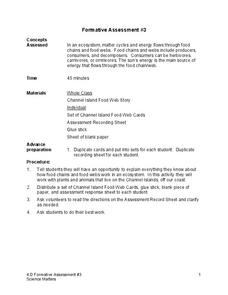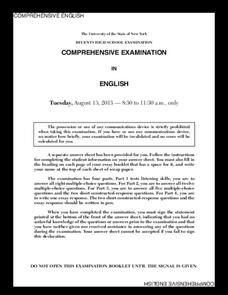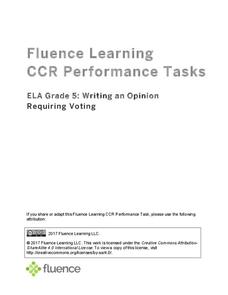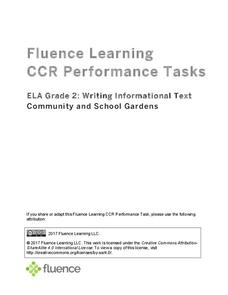New York State Education Department
English Language Arts Examination: August 2017
Reading and comprehending a poem is a lot different than doing the same for a piece of fiction or an informational text. As part of a sample English language arts examination, readers put their skills to the test by reading passages in...
Curated OER
Literature and the Language Arts
Reading involves more than simply picking up a text and saying the words aloud. A practice guide introduces readers to key skills such as making inferences, finding the main idea or theme, and using context clues. Each skill contains a...
Science Matters
Formative Assessment #3
Thirteen short-answer questions follow a brief food web activity in a formative assessment designed to test knowledge of ecosystems and the energy that flows through them.
Los Angeles County Office of Education
Assessment for the California Mathematics Standards Grade 2
Test scholars mathematic skills with an assessment addressing addition, subtraction, multiplication, place value, measurement, geometric shapes, expanded notation; and their ability to compare numbers, write number sentences, draw...
E Reading Worksheets
Summarizing Text
Help learners find the most important information in a text with a lesson on summarizing. As kids read through a passage about Johannes Gutenberg, they summarize small excerpts, put events in sequential order, and respond to two longer...
College Board
Reading—Synthesis and Paired Passages
Good readers make connections between texts. The SAT regularly assesses the ability to make those connections using paired reading passages, a topic discussed in an official SAT practice lesson plan on synthesis. During the lesson,...
New York State Education Department
Comprehensive English Examination: June 2016
Those in positions of authority don't always have the best interest of their people in mind. As part of a sample assessment question, readers must consider how works of literature they read apply to a quote from Edmund Burke—"The greater...
California Education Partners
Frog and Toad Together by Arnold Lobel
A three-part assessment tests scholars' reading and writing capabilities. Young readers listen to and read an excerpt from Frog and Toad Together by Arnold Lobel. After drawing pictures of what is memorable, learners discuss their notes...
EngageNY
Mid-Unit Assessment and Discussing Themes in Esperanza Rising: (Chapter 9: "Las Ciruelas/PLums")
Give this skills-based assessment halfway through your unit on Esperanza Rising. After a brief review, class members take the test, which asks them to show that they know how to analyze the novel independently. They are asked to...
New York State Education Department
English Language Arts Examination: June 2018
Is graffiti art? Writers explore that question as part of a source-based argument within a set of questions from the NY Regents examination. The assessment from June 2018, part of a larger set of standardized tests, consists of three...
New York State Education Department
English Language Arts Examination: January 2018
Excerpts from classic novels make great material for standardized tests. A sample English language arts examination, part of a larger set of assessments, mixes excerpts from classic novels and more modern texts. The test includes three...
Science Matters
Earthquakes and Volcanoes Post Assessment
The final lesson in the 20-part series is a post assessment covering earthquakes and volcanoes. Twenty-three questions incorporate each of the previous lessons through multiple choice, justified multiple choice, expanded multiple choice,...
Stanford University
Iranian Constitutional Revolution
What makes a good primary source? The assessment tests pupils' knowledge of how to use primary sources with written responses. Designed for high school social studies, it requires scholars to read and analyze a text excerpt concerning...
California Education Partners
Follow the Water by Arthur Dorros
Assess scholars' reading and writing capabilities with an exam that challenges learners to respond to an informative text. Through note-taking and peer discussion, pupils analyze a passage from the story, Follow the Water from Brook to...
New York State Education Department
Comprehensive English Examination: June 2013
Tired of having to create your own formative assessments? Use a ready-made resource to assess listening and reading comprehension, essay writing, and literary skills. Scholars work through 28 questions in response to five different texts.
New York State Education Department
Comprehensive English Examination: August 2012
Looking for a resource to wrap up all English skills in one? Here's a comprehensive resource that includes listening and reading passages, responding to poems, writing an essay, and analyzing a quote. The packet includes passages and...
New York State Education Department
Comprehensive English Examination: August 2013
Individuals exercise their minds by taking the Comprehensive Examination in English, which assesses listening and reading comprehension and writing aptitude. Scholars answer multiple-choice questions and write two short-response essays....
New York State Education Department
English Language Arts Examination: June 2016
The English Language Arts Examination handout contains a variety of multiple-choice questions to assess reading comprehension, in addition to a source-based argument essay and text-analysis response prompts.
Mathed Up!
2D and 3D Shapes
What a great assessment to give young mathematicians in order to test their knowledge on two- and three-dimensional shapes. Learners name various shapes, identify the number of edges, faces, and vertices, match an unfolded version of a...
Illustrative Mathematics
Assessing Sequencing Numbers
Assess whether your kindergartners can identify numbers in random order using two sets of numeral cards 1-10 and 11-20. Starting with a small group and the 1-10 deck give your learners the task of putting the cards into order from...
New York State Education Department
English Language Arts Examination: June 2017
Plants prefer classical music to rock and roll. That's one of the claims in an informational passage that makes up part of a set of standardized assessment questions. The set is part of a larger collection of English language arts tests...
Fluence Learning
Writing About Literature: Comparing and Contrasting Characters in Heidi
Scholars read excerpts from the story, Heidi, in a three-part assessment that focuses on comparing and contrasting characters. Each part contains three tasks that challenge learners to discuss, answer comprehension questions,...
Fluence Learning
Writing an Opinion Requiring Voting
Challenge writers to compose an essay detailing their stance on, and the history of, voting. Three assignments, each broken down into three parts, requires fifth graders to take notes, read and complete charts, write paragraphs, compare...
Fluence Learning
Writing Informational Text: Community and School Gardens
Two informational texts feature community gardens of the past and present and how seeds grow. Scholars read, discuss what they have read, complete a timeline, define words, and compose a brief essay about the texts' main idea.

























